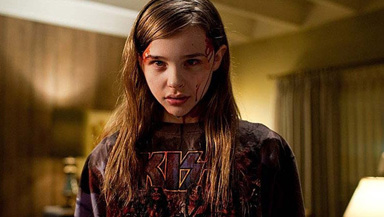The 400-Word Review: Carrie
By Sean Collier
October 21, 2013
BoxOfficeProphets.com

Neither King’s book nor Brian de Palma’s classic 1976 film are abused or significantly rewritten; screenwriter Roberto Aguirre-Sacasa leans closely on the scenes (and even dialogue) in Lawrence D. Cohen’s script. Director Kimberly Peirce strays from de Palma’s style, but maintains the overarching metaphor of King’s work. This Carrie won’t be unfamiliar to fans of the tormented girls that have come before.
Unfortunately, that also means it has little new to offer.
The plot is the same: Carrie, the daughter of a deranged and prudish zealot, transitions from quiet outcast to laughing stock when she’s horrified and bewildered by the arrival of her first period in the gym showers. Some students plot further humiliation, others try to help, and mom gets even crazier. Oh, and Carrie has telekinetic powers.
It’s still all about sexual awakening, female empowerment and teenage uncertainty; in every iteration of Carrie (okay, maybe not the musical,) that’s all there and it always works. Other than some technological necessities — hello, cyber-bullying! — and a handful of unnecessary-if-minor additions, Pierce’s Carrie is simply a retelling.
Chloe Grace-Moretz’s turn in the title role is a little bit more savvy, emotive and headstrong than Sissy Spacek’s; the first performer got it just right, but Grace-Moretz does a fine job with her rendering. Julianne Moore ups the psychosis and downs the matronly charm on Margaret White, with mixed results; she’s clearly trying to distinguish herself from Piper Laurie’s Oscar-nominated turn.
Aguirre-Sacasa’s script is subtle and selective in its attempts to further elucidate on King’s story, and most of its additions concern Margaret. A before-the-credits opening sequence of Carrie’s birth, meant to mirror the shower scene, is the film’s weakest moment; a harrowing scene at Margaret’s place of employment, a sleepy dry cleaner’s, does better. Aguirre-Sacasa gives Carrie more than she might need, but doesn’t mess with the character.
It all hinges on the climactic bloodbath, which is close enough to the mark; it might’ve been a bit longer, but pays off the slow build of the story as it should. That’s the order of everything in this Carrie: a little different, fair enough and familiar. There’s nothing to condemn it — but nothing to recommend it over another visit to de Palma’s film, either.
Sean Collier is the Associate Editor of Pittsburgh Magazine and a member of the Broadcast Film Critics Association. Read more from Sean at pittsburghmagazine.com/afterdark